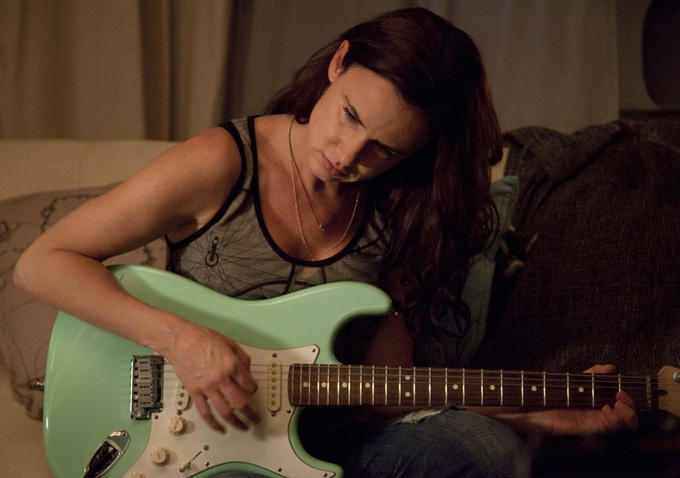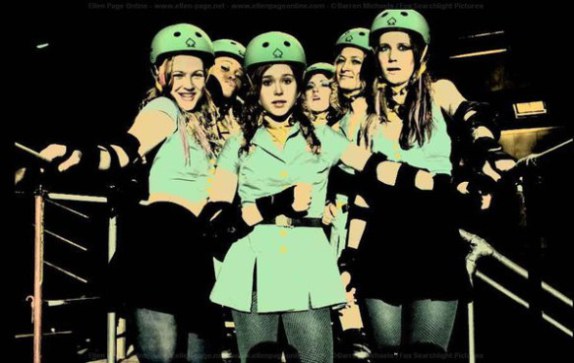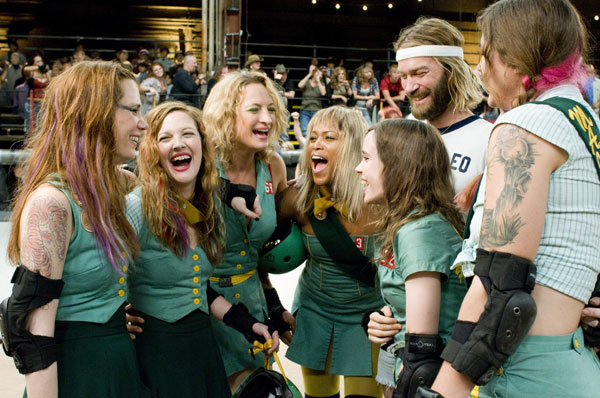Many actresses, especially those in their 30s and older, find themselves relegated to playing “the mother” for much of their careers. Most of these films (like the recent indie hit Boyhood) seem to go out of their way to tell stories from anyone but the mother’s point of view. For a short time Jen McGowan’s Kelly & Cal (also written by a woman: Amy Lowe Starbin) seems like it will be a welcome contrast to this norm. At the beginning we see a closeup of the tired, stressed face of new mother, Kelly (Juliette Lewis), as we hear the pleasant, disembodied voice of Kelly’s OB/GYN, who indulges in the (relatively recent) abhorrent practice of referring to women who are pregnant or have recently given birth as “Mom” (instead of calling them by their names) while she rushes Kelly through her six-week checkup. The doctor isn’t the only offender: “How was your day, Mommy?” Cybill Shepherd’s squeaky clean mother-in-law later asks when she visits for dinner.
We again see closeups of Kelly’s unhappy face as she (and we) hear her baby constantly crying, interrupting her even when she tries to masturbate–after her husband proves more interested in TV than in sex. We learn Kelly’s name only when she introduces herself to Cal. They meet over her fence as Kelly sneaks a cigarette and Cal asks if he can have one too. Cal is supposed to be 17 or l8, but the handsome and not untalented Jonny Weston, who plays him, is–and looks–26. Throughout the film, whenever he talks about attending high school I felt like correcting him, “Don’t you mean graduate school?” The actor visibly being well past his teens makes Cal’s banter seem particularly inappropriate and creepy.
He tells Kelly (whom he’s just met) “You have great breasts,” then admonishes her that if she didn’t want him to comment on them she shouldn’t nurse her son with the curtains open (sort of like how some men feel free to advise celebrities never to pose for private nude photos if they don’t want the world to see them).
Kelly immediately tells him, “Get away from my house,” then sees he uses a wheelchair as he rolls back toward his own place. That evening she tells her husband she feels bad that she yelled at someone who is “handicapped,” the word used to describe Cal throughout the film, even though “people with disabilites” has been common parlance–including in the Americans With Disabilities Act–for over 25 years. I guess we should be grateful the film doesn’t have any queer characters, so we don’t have to hear them called “homosexuals.”

The movie really goes off the rails after Kelly appears at Cal’s garage apartment (his parents’ house hasn’t been equipped with ramps) as an apology, but quickly leaves (Juliette Lewis is quite funny in this scene; she’s better than the film deserves) when Cal continues to talk explicitly about sex (this time about his own prowess even after the accident that caused his spinal cord injury). Her actions are perfectly in keeping with everything else we’ve seen so far from Kelly. So the audience is left to wonder why, the next day, she goes back to visit Cal as if nothing has happened. If Kelly were meant to be a damaged character, a woman who felt that being in the company of someone who humiliates her by talking explicitly about her body (which he spied on while she was behind closed doors in her own house, feeding her son)–and then told her all the sexual things he could do to her–is all she deserves, I could accept this plot point. But as the part is written (up until that point in the film) and as Lewis plays her, Kelly is a level-headed sort, even if she feels lonely and out-of-place in her new role as a suburban stay-at-home mother. Kelly and Cal’s “friendship” in this context makes no sense and seems to bolster the philosophy of street harassers and “pickup artists” that talking explicitly to women they barely know (and who don’t seem open to their sexual attention) is the way to attract them.
For extended periods that follow, the film (which seems long but is actually only 110 minutes), in the tradition of soap operas, seems to forget Kelly has a baby. We see her freely drinking beer and other alcohol when before she had demurred explaining that she was still breast-feeding (if the TV series Please Like Me can be trusted, apparently breastfeeding mothers can pump their milk before the occasional drunken night out, but the movie doesn’t care enough to offer this explanation). She and Cal spend lots of time alone together, after which she often goes home to an empty house–when new parenthood means (as the start of movie makes clear, and shows is a major part of Kelly’s frustration), except for brief respites when others take over, the baby is always there.

We get a tiny subplot that goes nowhere about Kelly once being “young and wild” and “in a band” which seems cribbed from a Wikipedia entry about “Riot Grrrl,” especially when the characters repeatedly mispronounce “Sleater-Kinney” as “Sleeter-Kinney.” The film also uses a Cyndi Lauper song, the polar opposite of “wild,” as one of of Kelly’s favorites. Kelly ends up kissing Cal because his harassment somehow ends up charming her. She also does a little breaking and entering and graffiti with him as foreplay.
Cal, on the other hand, inhabits the trope of the disabled character who feels like life is no longer worth living. A person with disabilities who becomes suicidal is such a cliché that When Billy Broke His Head, a too-infrequently seen documentary about disability–directed by a disabled man–had a sequence that was a montage of disabled characters in film after film announcing their intentions to kill themselves. Audiences would object if every woman in films wanted to off herself–or if every person of color did. And we’re glad that modern queer characters in dramas like Weekend, Keep The Lights On, and Pariah survive to the credits because in the past the rule seemed to be that one (or more) of a film’s queer characters must die by the end. But the disabled character (and there’s usually only one), if he or she isn’t busy being an inspiration to others, is, in too many films and TV shows otherwise on the brink of suicide. We could use more characters like Winston (Clifton Collins Jr.) in Sunshine Cleaning, who was missing an arm, but was neither depressed nor awe-inspiring, just a person trying to get through life.
A film with real distribution (it opens on Sept. 5) directed by a woman as well as written by one is a rare enough occurrence that I wish I didn’t have to point out all that’s wrong with Kelly & Cal. But if a film has the same old sexist (not to mention ableist) tropes, we have remember why we wanted more films by women in the first place–and see that maybe this particular example isn’t solving the problem.
As Susan Sarandon (in The Celluloid Closet) said of their love scenes in The Hunger, no one needs to get drunk to kiss Catherine Deneuve. In the same way, nobody needs to lower their standards to love the films of women like Stacie Passon, Miranda July, Dee Rees, Sarah Polley, and Andrea Arnold. But film distributors still treat an acclaimed queer woman’s film about a queer woman, Concussion, as subpar: last year the rapturous reviews it received from a number of influential critics came too late for it to have a real run in many cities that might have embraced it, (including mine which is full of art houses and is in the first state to legalize queer marriage). One Cut, One Life the documentary co-directed by and featuring Lucia Small was the best film I saw at the Independent Film Festival of Boston (where I saw Dear White People, Belle, and Obvious Child) and probably the best documentary I’ve seen this year (a year that included Elaine Stritch: Shoot Me and Anita) but even though it plays at The New York Film Festival Sept. 29 it still doesn’t, as far as I know, have a distribution deal. The only way to fight against this tide is to keep praising good films by women–and not dilute that praise by heaping it onto other films that happen to have women’s names on them.
[youtube_sc url=”http://www.youtube.com/watch?v=FpasJxRqCjU”]
___________________________________
Ren Jender is a queer writer-performer/producer putting a film together. Her writing. besides appearing every week on Bitch Flicks, has also been published in The Toast, RH Reality Check, xoJane and the Feminist Wire. You can follow her on Twitter @renjender.






